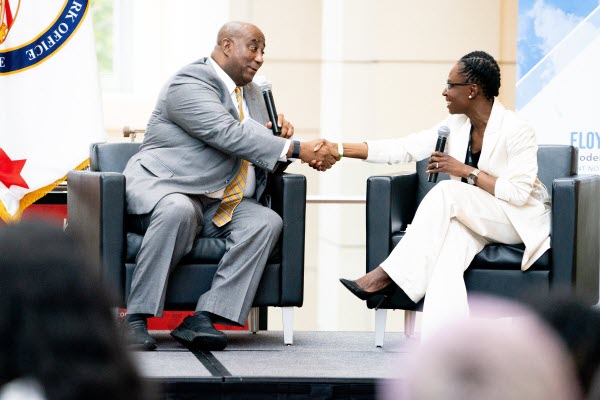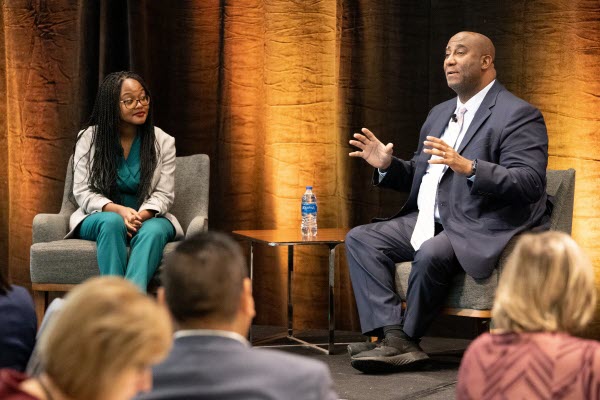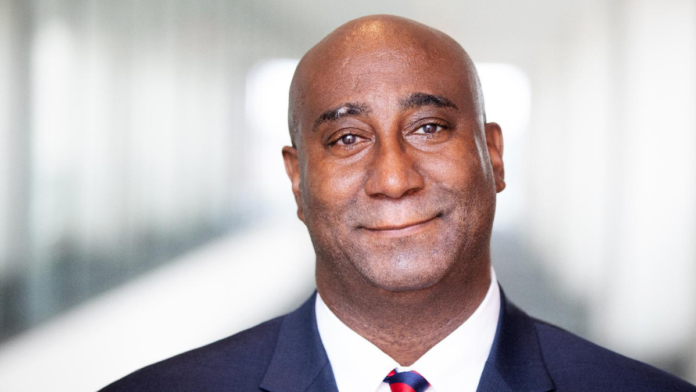( ENSPIRE Community Spotlight ) Derrick Brent Discusses The Importance of HBCU Libraries
ENSPIRE Contributor: Gabrielle Maya
In current news, four HBCU libraries exist in the country’s United States Patent and Trademark Office (USPTO). These Patent and Trademark Resource Centers (PTRC) are part of a national network of public, state, and academic libraries whose goal is to assist the public. These designated centers include Howard University’s Founders Library, designated on December 8, 1986; John B. Cade Library at Southern University; and A&M College, designated on October 12, 2023. In addition, John B. Coleman Library at Prairie View A&M University, designated on October 16, 2023, and Miller F. Whittaker Library at South Carolina State University, designated on December 6, 2023. A human touch staff are local information experts trained by the USPTO to learn how to use search tools to access information and navigate their patent and trademark journey.
These four HBCU libraries offer various services, including online resources, research consultations, and workshops to share information on the importance of intellectual property. Their key focus is innovation and community empowerment. Two important individuals are a part of the USPTO who provide the community with access to these libraries that carry information for their patent and trademark initiatives. Kathi Vidal is the USPTO’s Under Secretary of Commerce for Intellectual Property Director. Derrick Brent is the Deputy Under Secretary of Commerce for Intellectual Property and Deputy Director of the USPTO.

We discussed with Derrick Brent the importance of patents and trademarks, the struggles within the Black entrepreneur community to achieve inclusivity and online resources and workshops, and the overall goal of the HBCU Libraries.
What are patents and trademarks and their usage and importance?
Trademarks are essential to any business, and understanding them is crucial for any business owner. A trademark can be any word, phrase, symbol, design, or combination that identifies your goods or services. It’s how customers recognize you in the marketplace and distinguish you from your competitors. Trademarks can also convey intellectual and emotional attribute messages about a business, which can be effective communication tools. Traditionally, “trademark” is used for brands that identify goods, and “service mark” is used for brands that identify services. However, using “trademark” to refer to goods and services is acceptable.
A trademark:
- Identifies the source of your goods or services.
- Provides legal protection for your brand.
- It helps you guard against counterfeiting and fraud.
Often confused with patents and copyrights, trademarks protect different types of intellectual property. Trademarks protect brand names, slogans, and logos. Patents protect new inventions and processes. Copyrights protect original artistic works. Patents are defined as technical inventions, such as chemical compositions. Examples include pharmaceutical drugs, mechanical processes like complex machinery, or machine designs that are new, unique, and usable in some industries.
By filing federal protection for your patent, you safeguard your inventions and processes from other parties copying, making, using, or selling them without the inventor’s consent. Our website has an IP Identifier tool that can help you identify the kind of intellectual property you have.
Could you describe some struggles many in the Black community face in achieving a more inclusive and thriving innovation ecosystem?
From some of our discussions with Black entrepreneurs, we learned that Black entrepreneurs benefit from breaking down silos and need bridges to information and support for building networks and mentors. Black entrepreneurs tend to pay their success forward when they make it, mentor others, teach, advise, and provide information; supporting ways to pay it forward is a way to support the community. They feel that, in some cases, their ultimate success begins with them having business success in the Black community/marketplace.
IP protection is essential because it is crucial to learn about IP as an entrepreneur; important protection as black entrepreneurs work through a long ladder of pitches for funding or business collaborations. Black entrepreneurs tend to work for companies where they obtain business skills before setting off independently.
What are some examples of online resources, workshops, and research consultants?
USPTO offers several online tools and programs for those new to intellectual property, thinking about inventing or starting a business, or anyone who has been in it a while and needs a refresher. We have something for everyone:
- Introduction to patents and trademarks classes.
- Inventor and entrepreneur resources.
- IP identifier tool to determine the type of IP you have.
- Trademark search tool to see if your idea already has a trademark.
Our in-person resources include the Patent and Trademark Resource Centers (PTRCs). The PTRC Program manages a nationwide network of academic, public, and state libraries that have been designated PTRCs. These resource centers provide the public with various trademark and patent assistance. If you want to patent an invention or register a trademark, you don’t have to navigate the process alone. PTRC representatives are trained to help inventors and small businesses find the information they need to protect their intellectual property (IP). There are currently 91 public and academic libraries in the program.
The USPTO operates a headquarters and Eastern Regional Outreach Office in Alexandria, Virginia, and has a presence in every U.S. time zone. Four additional offices are located in Dallas, Detroit, Denver, and Silicon Valley, and a new regional office in Atlanta will open in 2025. The regional offices assist inventors, entrepreneurs, and small businesses in all IP areas. Staff in our offices work closely with intellectual property practitioners and services, startups, and job-growth accelerators.
In addition, they also collaborate with local science, technology, engineering, and mathematics organizations on outreach and educational programming. We are an agency that promotes inclusive innovation, and we wanted to give those facing financial challenges an opportunity to pursue their creativity; thus, the Patent Pro Bono Program was formed. This program offers a nationwide network of independent programs that match patent attorneys and agents who volunteer their time with financially under-resourced inventors and entrepreneurs. Some requirements are based on each regional program.
Furthermore, independent inventors and small businesses also have access to the Pro Se Assistance Center. The Pro Se Assistance Center provides outreach and education to applicants who file patent applications without the assistance of a registered patent attorney or agent. One-on-one assistance is available via video conference or telephone. Prose personnel can meet with applicants to answer patent-related questions and assist in filing their applications. Our free resources, tools, and programs are on our website at USPTO Learning Resources.
What is the overall goal to ensure that Black creators, inventors, and entrepreneurs have access to these resources in other areas of the United States?
We must meet people where they are, educate them, and provide all the tools necessary to succeed in their entrepreneurial journey. We are dedicated to advancing equity among innovation and business ownership in the Black community. In February, we signed a Memorandum of Understanding (MOU) with The National Business League (NBL) to advance Black entrepreneurship and safeguard intellectual property rights. This understanding will allow Black entrepreneurs access programs and resources vital to their success.

What lengths are being made to increase the number of PTRCs at HBCUs and educational programs nationwide?
We are committed to increasing the number of PTRCs at HBCUs and educational programs nationwide to ensure that Black creators, inventors, and entrepreneurs access these key resources. As part of our continued effort to expand the number of PTRCs across the country, Under Secretary of Commerce for Intellectual Property and Director of the USPTO, Kathi Vidal, issued letters to 600 libraries across the country, including all HBCUs, inviting each institution to consider becoming PTRCs to assist their local innovators.
Because of this letter-writing campaign, nine new libraries signed up to be part of the PTRC network, including three HBCUs (Southern U in Baton Rouge, South Carolina State U in Orangeburg, SC, and Prairie View A&M U in Prairie View, TX).
Patents and trademarks are important parts of any business. With the help of the four essential HBCU libraries, many businesses and entrepreneurs, especially in the Black community, can have the important resources to get started and understand. For more information, here is a link to the USPTO website to find a list of PTRCs by state.
Related Articles: Dr. Sabine Charles Provides Business Owners Consultative Services, Brooke and Xavier the Dynamic Duo in Business, Love, and Representation










